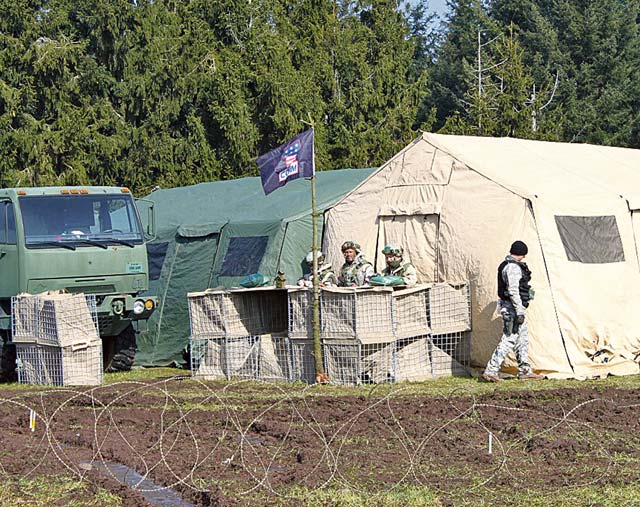
Airmen from the 1st Combat Communications Squadron guard an entry control point May 24 on Ramstein. The 1st CBCS recently conducted phase two of a series of exercises, that will test Airmen’s proficiencies and ensures they are prepared for real-world missions.
The 1st Combat Communications Squadron recently conducted quarterly proficiency training that ensures their Airmen are prepared for real-world missions.
This Phase, called “Healthy Star,” is where the 1st CBCS conducts field training. In this phase they validate their skills through planning, deploying and operating tactical communications equipment.
“Healthy Star is our current operation and one of our most important,” said Maj. Brian Carpenter, 1st CBCS director of operations. “It removes the element of comfort and allows the team to practice their mission in difficult training scenarios.”
Phase one was the previous training that was conducted in equipment garages that are protected from weather. This is where the team becomes familiar with the main objective of their operations. They set up a complete communications system after each member of the team has qualified through flight-level training.
“It’s crucial to our mission,” Carpenter said. “Preparing our Airmen by not only ensuring they are capable but also ensuring they are efficient in what they do.”
Phase three is “Healthy Thunder,” which will be conducted in June. It is a field exercise similar to “Healthy Star” but includes core readiness training elements.
“We put them in a deployed environment where they must self-sustain their communications, living facilities and safety so they can test their own abilities,” Carpenter said.
The 1st CBCS looks to concentrate on three areas that are critical to the success of any mission or exercise: security, safety and readiness.
The lessons they learned from prior operational readiness exercises has helped to improve mission capabilities today.
During the training Airmen were able to practice providing secure voice calls, DSN, secure video teleconferencing, NIPR, SIPR, land mobile radio and air-to-ground radio assets, which enable the deployed commander with command and control over the area of operation.
“This training means a lot,” said Chief Master Sgt. Phillip Hudson, 1st CBCS superintendent. “It’s the mid-point to finding out if Airmen are capable enough to be certified for wartime deployments.”
The 1st CBCS looks to continue conducting training to assist 3rd Air Force in developing contingency plans for future operations.


